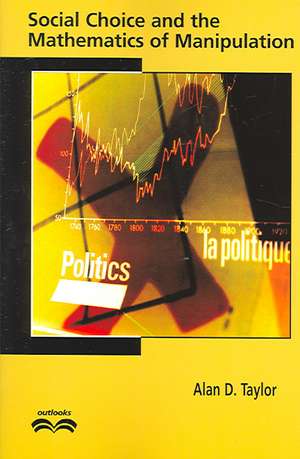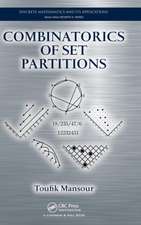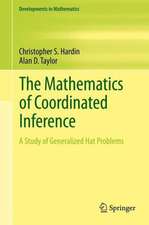Social Choice and the Mathematics of Manipulation: Outlooks
Autor Alan D. Tayloren Limba Engleză Paperback – 8 mai 2005
| Toate formatele și edițiile | Preț | Express |
|---|---|---|
| Paperback (1) | 317.99 lei 6-8 săpt. | |
| Cambridge University Press – 8 mai 2005 | 317.99 lei 6-8 săpt. | |
| Hardback (1) | 692.83 lei 6-8 săpt. | |
| Cambridge University Press – 8 mai 2005 | 692.83 lei 6-8 săpt. |
Preț: 317.99 lei
Nou
Puncte Express: 477
Preț estimativ în valută:
60.86€ • 63.30$ • 50.24£
60.86€ • 63.30$ • 50.24£
Carte tipărită la comandă
Livrare economică 12-26 aprilie
Preluare comenzi: 021 569.72.76
Specificații
ISBN-13: 9780521008839
ISBN-10: 0521008832
Pagini: 190
Ilustrații: 3 b/w illus. 80 exercises
Dimensiuni: 153 x 229 x 17 mm
Greutate: 0.28 kg
Editura: Cambridge University Press
Colecția The Mathematical Association of America
Seria Outlooks
Locul publicării:Washington DC, United States
ISBN-10: 0521008832
Pagini: 190
Ilustrații: 3 b/w illus. 80 exercises
Dimensiuni: 153 x 229 x 17 mm
Greutate: 0.28 kg
Editura: Cambridge University Press
Colecția The Mathematical Association of America
Seria Outlooks
Locul publicării:Washington DC, United States
Cuprins
1. Introduction; 2. The Gibbard–Satterthwaite theorem; 3. Additional results for single-valued elections; 4. The Duggan–Schwartz theorem; 5. Additional results for multi-valued elections; 6. Ballots that rank sets; 7. Elections with outcomes that are lotteries; 8. Elections with variable agendas; References; Index.
Recenzii
'… well organised and clearly written, with subtle differences in similar situations being deftly dealt with. In conclusion, this book is a little gem. It will be especially prized by those who need to understand voting systems and how they can be manipulated by individual voters.' Mathematics Today
'Overall, I think this book is the must-have-on-the-shelf for scholars interested in social choice, including economists, philosophers, mathematicians, and political scientists. If a reader takes the effort to go through the book thoroughly, the benefits, in my opinion, would be enormous.' Psychometrika
'Overall, I think this book is the must-have-on-the-shelf for scholars interested in social choice, including economists, philosophers, mathematicians, and political scientists. If a reader takes the effort to go through the book thoroughly, the benefits, in my opinion, would be enormous.' Psychometrika
Descriere
A mathematical look at why it is impossible to devise a completely unmanipulable voting system, first published in 2005.


















